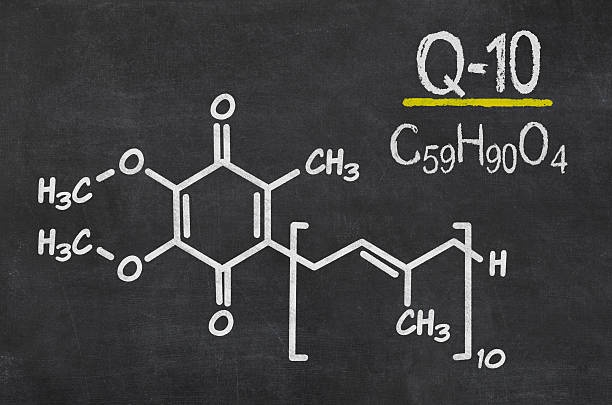
Coenzyme Q10: Why Take CoQ10 Supplements
Coenzyme Q10, CoQ10, is a very powerful antioxidant that is made in your mitochondria. Your mitochondria are the energy powerhouse of the cells in your body and help to convert fats and other molecules they interact with into ATP (your body’s energy currency). Because of the sheer amount of functions your brain does, the brain has one of the highest densities of mitochondria in your whole body. Mitochondria are present in pretty much every cell. Coenzyme Q10 is needed in every single cell of your body, performing the same function in other tissues as with nerve cells (neurons) in the brain.
In fact, your demand for CoQ10 is so high that it is used far quicker than you can even produce it. This means basically means your body can’t get enough of the stuff. This really emphasises the need for you to maximise your intake of CoQ10.
CoQ10 as a Powerful Antioxidant
When acting as an antioxidant, CoQ10 protects neurons (nerve cells) from potential cell death and severe damage caused by free radicals that are ‘electron hungry’; free radicals will ‘attack molecular parts of your cells’ making them damaged and not function properly.
This includes your DNA; understandably this can lead to potentially severe consequences for your cells as they replicate and try to do their daily functions. This can also trigger cell stress; other bodily consequences and brain cancer.
Antioxidants are the opposite of free radicals and have spare electrons they can use to neutralise free radicals. They come to the rescue of the cells under high amount of ‘cell stress’ caused by free radicals. Without proper protection from free radicals by antioxidants such as Coenzyme Q10 (CoQ10), neurons can potentially die and this will damage your ability to process information.
The same is true for all your cells in the body. Antioxidants prevent free radicals causing heavy cellular or DNA damage which can lead to cancer. Nerves also require an adequate supply of energy to support normal cognitive functioning. Coenzyme Q10 is essential for this within the mitochondria. This is why CoQ10 is a nootropic, it helps brain functioning.

CoQ10 Deficiency
Without antioxidant protection and the energy production CoQ10 provides for nerve cells, as seen in a major deficiency, you could expect reduced nerve cell signalling. That would lead to symptoms such as brain fog, low energy and cognitive decline.
The worst cases of CoQ10 deficiency result in serious intellectual disability, peripheral neuropathy and strokes. We naturally go through this process as a result of aging as brain cell membranes degenerate and neurotransmitter levels decline. It is widely accepted that CoQ10 production slows down during the aging process. Also aging-associated diseases such as dementia.
However these things are not set in stone, your choices can make a massive difference. Ensuring you have an adequate dietary intake of CoQ10 or supplementing with CoQ10 could help to slow the process. If you are looking to get CoQ10 from your diet, it is fat soluble and as a result can be obtained from meats including fatty fish, beef and poultry. Vegan sources of CoQ10 include: nuts and oils.
CoQ10 supplementation is very well tested with a large number of clinical trials and reviews having been completed. Blood concentrations of CoQ10 increase when the dose of Coenzyme Q10 is high. High amounts are needed for it to cross the blood brain barrier.

Results of Supplementing with CoQ10
The CoQ10 form, ubiquinol seems to also be better absorbed than ubiquinone. Clinical studies recommend 1200mg per day as the safest maximum dose for Coenzyme Q10 supplementation. Although 3000mg/day has been safely used in some trials. Experimental studies in animals have shown that CoQ10 supplements could be promising as a clinically effective neuroprotectant.
When elderly patients were given selenium with CoQ10 they reported an improvement in their quality of life, vitality and physical performance over 4 years. That is a phenomenal amount of time where the beneficial effects have been measured. CoQ10 supplementation reduces chronic oxidative stress in elderly people who suffer with diseases affecting the brain and cardiovascular system.
CoQ10 also plays an additional role in cell membranes. It can reduce the antioxidant vitamins C and E to active forms, while also stopping pre-mature cell death. These are important factors for normal aging.
CoQ10 has been shown to help prevent cardiovascular disease (CVD), a major health factor as we age. Taking around 300mg/day CoQ10 for two years helped to reduce major cardiovascular or events of the heart, without having to exercise. It is thought that its antioxidant activity helps to reduce atherosclerosis through reduced LDL counts. CoQ10 also seems to have beneficial effects on fertility in both males and females. This is another problem that develops as we age.
Taking 200-300mg per day CoQ10 seems to improve a variety of factors attributed to sperm health.
Conclusion
CoQ10 clearly has massive potential to improve your overall wellbeing, no matter what age group you are in, but can especially help the elderly.
While CoQ10 could help protect and improve your cognitive functioning, CoQ10 is a clear and powerful antioxidant with many other positive effects.
There are many products and supplements available to assist with increasing CoQ10 intake, with the studies above highlight positive health effects of CoQ10. These include improved sperm health and improvements to your quality of life.





